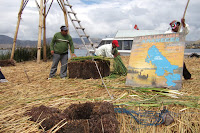
Travel Dates 30th March 2010.
Please click on any picture to see the larger version.
This is a brief report, because I found the Uros people of the reed islands of lake Titicaca both fascinating and sad. In my travels I try hard not to judge the cultures I encounter by Australian standards; what may be right for us may be wrong for them. But sometimes I fail. It is hard to look at the Uros people without wondering what the future holds for all those cute little children I saw.


The lake is the highest large lake in the world at a little over 3800 meters or a little under 12,500 feet. The floating islands are about an hour from Puno by boat.


Not all of the islands float. You will notice several solid buildings with metal roofs in the photos; they have foundations on solid ground which appears to be a central core to the islands floating near them.


The islands are based on these cubes of reed-roots cut from the reed-beds. They are linked together until a suitable platform is created then cut reeds are laid on top.


The base of the islands slowly rots away in the water so constant replenishment and maintenance of the reeds is needed. Walking on the islands is a little like walking on a mattress - springy and cushioned - except that if you don't tread carefully you may get wet feet. New islands are created to suit the family's or the community's needs, but that is becoming less of a job as the population of the islands is declining. Our guide mentioned that a decade ago the population was over 5000, now it is under 2000.
Their lifestyle is subsistence: fishing, making and repairing islands and reed boats, raising chickens and sometimes guinea pigs for meat, and nowadays tourism. The soft white core at the base of the reeds is also edible. I did notice a solar panel on one of the reed huts, so technology is slowly arriving.




But I must admit that my overwhelming feeling, as we chugged away on my ancient boat, was why are there still 2000 following this way of life? Supposedly they pre-date the Incas - and they out-lasted them – so I suppose it's possible they will outlast modern technology too. But I sincerely doubt it.




As I said; fascinating but sad.
Cheers, Alan

No comments:
Post a Comment